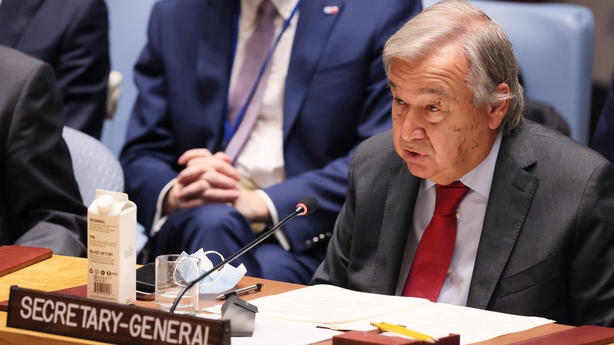Whoops, cheers and a standing ovation greeted the adoption at the UN of the world's first legally binding treaty on the protection of international waters.
For many delegates and campaigners in the room, this moment marked the end of a decades-long slog to get the UN’s 193 member states to agree on conservation measures and resource sharing in the high seas.
The high seas are the waters beyond national jurisdictions which make up two thirds of the world’s oceans and nearly half of the surface area of the planet.
Only 1% of these waters are protected under existing treaties.
Ocean campaigners hope that the Biodiversity Beyond National Jurisdiction Treaty (BBNJ) adopted will finally regulate human activity such as deep-sea mining, exploration, pollution and overfishing.
The treaty will also see the establishment of marine protected areas, much like national parks on land, in 30% of the world’s marine and coastal areas.

The Secretary General of the United Nations, António Guterres, called the agreement a victory for multilateralism.
"You have pumped new life and hope to give the ocean a fighting chance," he told delegates.
But he warned delegates that their work was not over yet.
The treaty will need to be ratified by 60 member states before it can go into effect.
For some countries, that means a lengthy process of parliamentary approval. Other countries will ratify through executive order.
"We urge world leaders to keep up the momentum for this new landmark treaty and pave the way for the creation of the first generation of marine protected areas on the high seas," Nichola Clark, an ocean governance expert with Pew Charitable Trusts, told RTÉ News.
The treaty opens for signatures on 20 September, during the UN's annual high-level meeting in New York.
"I think it is critically important that a large group of economically and geographically diverse countries sign the agreement in September," Lisa Speer, director of the International Oceans Program at the Natural Resources Defense Council (NRDC) told RTÉ News.
"I'm optimistic we can get to 60 ratifications by the June 2025 UN Oceans Conference in Nice," she added.
But another campaigner told RTÉ News, the road to ratification could be "long and bumpy," as some disagreements persist.
Within minutes of the treaty being adopted on Monday, the Russian Federation distanced itself from the consensus.
"The document does not reach a reasonable balance between conserving and sustainably using the resources of the ocean," the Russia’s representative, Sergey Leonidchenko, said.
The new agreement was at odds with other maritime laws such as international agreements on fishing, he told delegates.
The Russian representative also said the treaty failed to provide enough detail on financing the set up and monitoring of conservation in the high seas and suggested that the marine protection areas (MPAs) would instead be placed on a map "for political reasons".
"It’s true purpose would be to give advantage to some states and infringe on the legal marine rights and freedoms of other," Mr Leonidchenko told delegates.
One of the other key sticking points in the long-running treaty negotiations pit the wealthier nations of the global north against the developing countries of the global south.
They could not agree on how to share the largely unknown but potentially enormous benefits from the high seas – such as marine genetic resources – plants and animals which could have lucrative pharmaceutical, chemical or cosmetic applications.
In the end, developed countries, which carry out the bulk of expensive exploration and research, agreed to share monetary benefits at a flat rate initially, but to leave the door open to changing the financing model in future.
NGOs believe that the threshold of 60 ratifications required for it to enter into force should be reachable since the High Ambition Coalition for the BBNJ - which pushed for the treaty - counts some 50 or so countries as members, including those of the European Union, as well as Chile, Mexico, India and Japan.
But 60 is far from the universal adoption - the UN has 193 member states - that defenders of the ocean are pushing for.
"Let's carry this momentum forward. Let's continue working to protect our oceans, our planet, and all the people on it," said UN General Assembly President Csaba Korosi.
With additional reporting from AFP








